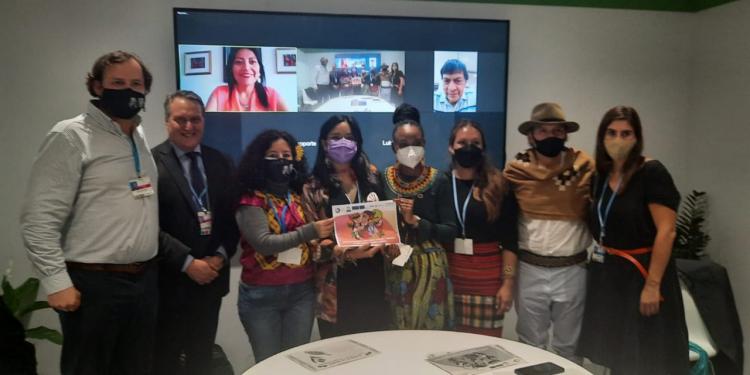The conclusions of the Intercultural Dialogue between Indigenous Peoples and Abya Yala governments on Climate Change were delivered today by the Fund for the Development of Indigenous Peoples of Latin America and the Caribbean (FILAC) and the Presidency of COP25, in charge of the Chilean government, to the authorities of the Platform of Local Communities and Indigenous Peoples (PCLPI) of the United Nations Framework Convention on Climate Change (UNFCCC), during the celebration of COP26 in Glasgow, Scotland.
The document, which was delivered by the Technical Secretary of FILAC, Gabriel Muyuy, to Hindou Mouroru, Co-chair of the Facilitating Working Group of the Platform of Local Communities and Indigenous Peoples, presents a summary of the main results and conclusions of the event that was held virtually on 21 and 22 July, which brought together representatives of different organisations, governments and civil society from 19 countries in the region and more than 90 organisations related to or constituted by indigenous peoples from Latin America and the Caribbean.
At the event, issues related to food, energy, water and forests were discussed and experiences were exchanged on an equal basis, exploring the contributions from the worldview of indigenous peoples and their contribution to the management of the climate crisis, the progress made by governments to incorporate the indigenous vision in public policies and the incorporation of inter-scientific dialogue in the mitigation and adaptation to climate change through questions for each thematic axis.
In his speech, Muyuy highlighted the role of indigenous peoples in addressing climate change. “It is necessary for the whole of humanity to change its attitude, its behaviour, but for this to happen, we have to educate, we have to widely socialise the decisions of COP26, but also the millenary historical knowledge of science and technology of indigenous peoples, which will surely contribute to tackling the climate crisis,” he said.
For his part, Andrés Landerretche, General Coordinator of the COP25 Presidency said that “this Latin American Dialogue of indigenous peoples and governments is a very dear project, an intense and very satisfactory work that would not have been possible without the support of the European Union and ECLAC. Today we are presenting the results of this dialogue, which we hope will be an input from the look of the Indigenous Peoples of the region and will contribute to the work of the Platform”.
Likewise, Hortencia Hidalgo, coordinator of FILAC’s Indigenous Women’s Programme, stressed the importance of “building a new political, social and environmental pact among all the inhabitants of Mother Earth to reverse the disastrous consequences of the climate crisis is one of the most important challenges that we find in these conclusions”.
The event was also attended by Calfin Laftkenche, president of the Indigenous Minga; Marina Casas, ECLAC representative in Chile and Europe; the Co-Chair of the Platform of Local Communities and Indigenous Peoples of the United Nations Framework Convention on Climate Change, among others.






